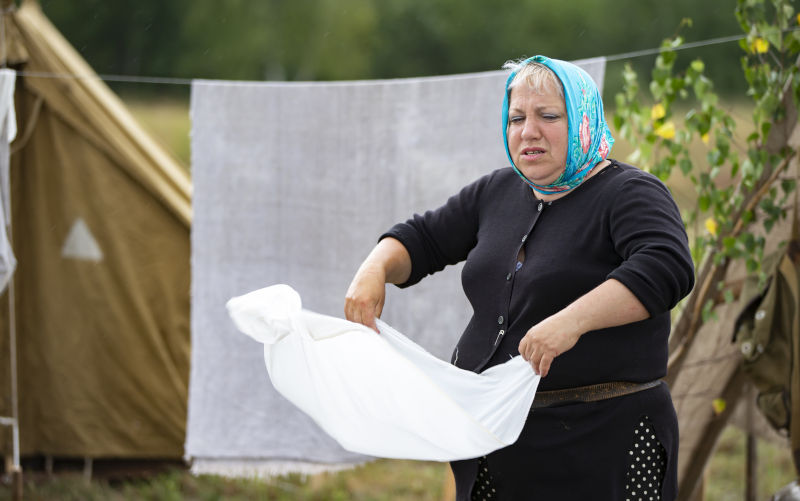It probably wasn’t the best time to venture near to the Belarus border.
But that’s exactly what I did a month or so ago. I spent a couple of weeks with my extended family in a small Polish town called ‘Azmol’ (not it’s real name). And extended the family certainly is, concentrated in a single village where members of the Hil clan dwell in a cluster of outsized houses. When l was last there in 1995, most of the houses, barns and stables were made of wood. Since then, remittance money and accumulated savings have enabled rapid redevelopment to occur. The stables have largely disappeared, but the houses and barns are now impressive, rendered brick dwellings.
I was hosted by my cousin, also called Richard Hil (Ryszard in Polish). He’s lived in Azmol his entire sixty-five years. It’s where his parents and grandparents lived, and where his kids were raised – in the house they’ll one day inherit.
The kids are raised by the village. They flit from one residence to another. Aunties, uncles, neighbours and friends look out for them. These are kids who feel comfortable in adult company. I spent many a delightful hour conversing with two of my young nephews who wanted to know everything about Australia, especially the koalas and kangaroos. They were polite, attentive, interested, and conversational – definitely not ratbags.
Although an outsider, it soon became clear to me that village life in this part of the world has been largely shaped by family lineage, a history of trauma, nationalist sentiment, and religiosity. On paper, this might sound like a toxic brew – and perhaps it is – but it seemed to enfold the family in ways that sustained and nurtured them. I’d often catch my second cousin at the kitchen table reading the bible. She attends the local church daily. It’s a level of devotion that we rarely see in Australia.
As Brigid Delaney observes in Wellmania, many of us in secular Australia take up things like yoga, meditation and the like, often at expensive overseas retreats, to fill what in many cases is a spiritual void. My Polish relatives had no such need. It’s right, I think, to remain wary of overly religious and patriotic leanings. But there was something so (literally) grounding in what I witnessed. And in a good way: above all, a sense of place, belonging, deep connection and attachment to land.
There are shadows, of course: the spectre of ethno-nationalism, religious dogma, nods toward Catholic authoritarianism – most of which didn’t really surface during my visit; but still, the danger lurks.
It was the bonding aspect of religiosity that I found most intriguing. Although I’m mindful of how religion can easily become a means of repression – an ‘opiate’- it can also offer tangible, life-affirming benefits.
It’s perhaps what the more virulent critics of religion like Chris Hutchins, Sam Harris and Richard Dawkins fail to comprehend. Maybe they’ve been too overly focused on disproving the existence of God and lampooning religious rituals and iconography to really notice the deep human needs that such things address. As Alain de Botton points out in Religion for Atheists, the void created by the demise of many of our social institutions, like the church, has in many respects ushered in more material devotions. In the face of growing personal and social discontent, De Botton argues for a secular spiritual space that offers quietude and contemplation as a respite from the noise conjured by modern life. I get that.
Back in Azmol, religious belief is key to everyday life. It cannot be separated from memories of war and conflict, displacement, removals, and decades of Soviet repression and poverty. Adherence to the missives of the Catholic church in this context is connected to a profound sense of nationhood. It has been thus for a very long time, even when the nation was carved up by various imperial powers. Remember, Poland only achieved statehood in 1918 following 100 years of partition, only to be carved up once again in 1939, this time by the Germans and Russians.
On my last day in Azmol I attended mass – something I haven’t done in years. The church – vaulted ceiling, bell tower, statues, paintings, and the rest – was packed. The service lasted well over an hour, followed by a slow, steady procession through the village. The Franciscan monk who presided over the whole thing looked and sounded like one of those Russian orthodox priests –a comparison that wouldn’t go down well among the denizens of Amzol.
Given this adherence to all things Polish and Catholic, it’s perhaps not surprising that there was not a single person I met who opposed the nationalist, staunchly pro-Catholic government of president Andrzej Duda. He might be getting a lot of flack throughout Europe, but in many parts of Poland he’s something of a saint. His ‘pro-family’ stance and message of national unity and common purpose resonates strongly through regional areas. Poland is like many other countries, including Australia, where there’s a deep city-rural divide. In Amzol I didn’t dare take to criticising Mr Duda, and nor did I confess to having joined in a protest rally in Warsaw.
Despite my reservations over the family’s support for Duda’s regime, their kindness, generosity and warmth was exemplary. I was astonished too by the way in which they lived. This was a family with no intention of budging. Unlike my cousin Richard, I’ve moved often, too often, throughout my life, both within and between countries. Something is lost in this constant shifting and changing; something that disrupts connection to place. The upshot is that I have little sense of place or belonging.
For the Hil family in Amzol, there are no such qualms. They know exactly where they belong, reflected in age-old practices of land cultivation and self-sustenance that one can only marvel at. The family grow most of their food, bake their own bread and cakes, prepare cured meats, and even brew their own alcohol. Fermentation, and the drying and bottling of things is normal. It’s gone on for eons. One morning my cousin Richard held aloft a freshly picked lettuce, announcing triumphantly, “look, no chemicals!”. Neighbours swap food, help fix things, and support each other in a host of other ways.
Now, don’t get me wrong, I’m no rural village utopian. But living in an increasingly lonely and disconnected society like Australia, I found the bonding to land and people in a tiny corner of northeastern Poland something to behold. It reminded me of the positive things that happen when people feel connected, are connected, and live out connection through what developmental psychologist Susan Pinker refers to as ‘the ‘village effect’.
While I would find the religiosity too much, and the political conservatism the same, I nonetheless think that such places remind us – or me at least – of the extent of social fragmentation and alienation in modern societies. We often hear talk of an ‘epidemic of loneliness’ of being ‘the loneliest generation that has ever lived’. As James Davies points out in How Modern Capitalism has Created our Mental Health Crisis, rampant individualism and hyper competitiveness have increasingly become the hallmarks of everyday life, with isolation deepened by our screen-centred obsessions. More and more people live alone, cut off from the connectedness that comes from being in the company of others. In Amzol, you won’t hear talk of community development, community building or indeed of community: it just is. It’s what happens every single minute of every day.
When it comes to Australia, the irony is that the people who do feel most enduringly connected to land and place, and who have the lineage and stories to prove it, continue to face the realities of institutional racism. Indigenous Australians are finding constitutional recognition and gaining a voice to parliament a struggle. It’s what happens when those with a more tenuous historical connection to country want their dominant interests protected. It’s hard to stomach.
I’m sure my cousin Richard would have a lot to say about this.
Adjunct Professor, School of Health Sciences and Social Work,
Griffith University (Gold Coast Campus).
Adjunct Professor, Southern Cross University, Faculty of Business, Law and Arts.

